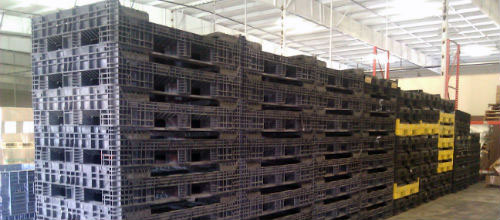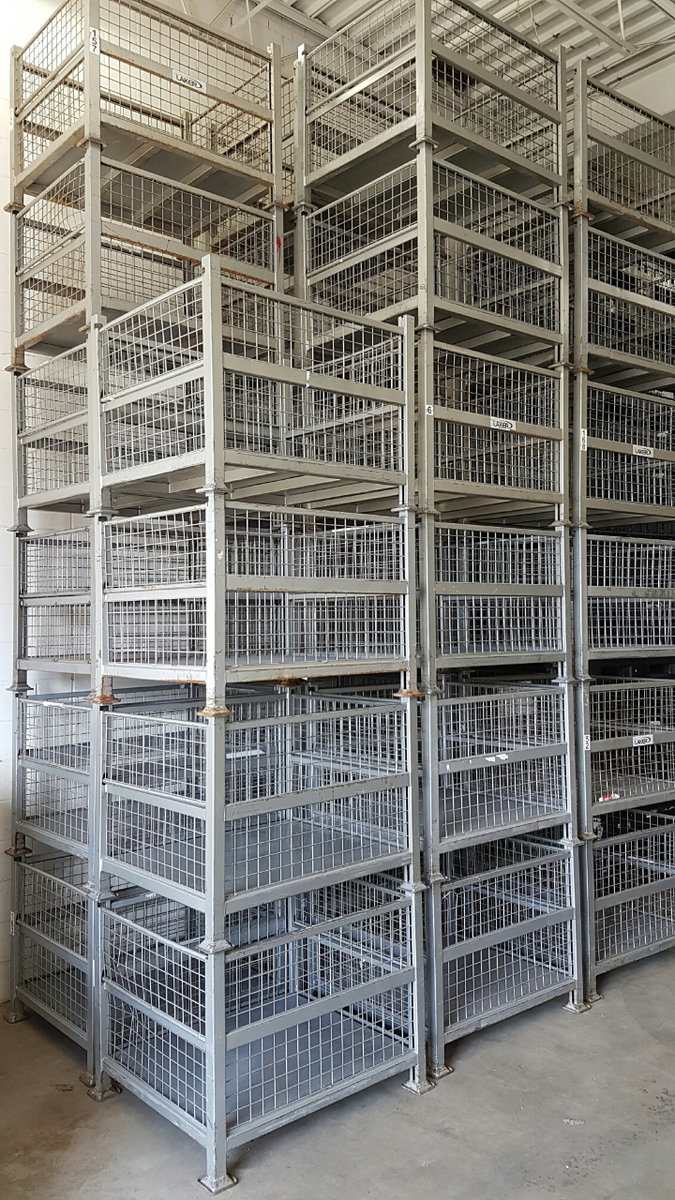The growing demand for used collapsible containers in logistics sectors
Why Mass Containers Are Vital for Sustainable and Economical Transportation
Mass containers play a crucial duty in contemporary logistics. They assist in the efficient motion of big quantities of goods, thereby optimizing transport processes. This technique not just lowers expenses however additionally reduces ecological impact with reduced exhausts and waste generation. As industries seek more sustainable methods, the fostering of bulk containers is ending up being progressively significant. What ramifications does this change hold for future logistics and supply chain management?

The Advantages of Utilizing Mass Containers in Logistics
Mass containers reinvent logistics by enhancing efficiency and sustainability. These containers permit the transportation of huge quantities of items in a single journey, considerably lowering the number of trips needed. This not just enhances procedures however also minimizes labor costs related to handling, packing, and discharging. Additionally, bulk containers are made to maximize area application within transport automobiles, making certain that more products can be shipped concurrently.
The standardization of mass containers additionally streamlines the logistics process. With consistent dimensions, they can be quickly piled and kept, bring about improved storage facility monitoring. Additionally, mass containers typically feature sturdy materials that safeguard materials from damages throughout transit, thereby decreasing item loss and enhancing general dependability. Therefore, organizations can experience enhanced supply chain performance, ultimately causing enhanced success and consumer fulfillment. This combination of elements makes mass containers an important property in modern-day logistics.
Environmental Influence: Minimizing Waste and Carbon Impact
As markets significantly focus on sustainability, the fostering of bulk containers has actually emerged as a vital approach for decreasing waste and reducing carbon impacts. These containers lessen using product packaging materials, such as boxes and plastic, consequently significantly lowering overall waste generation. By consolidating shipments, mass containers boost transportation performance, enabling more products to be transported per journey. This decrease in journeys directly correlates with reduced greenhouse gas exhausts, adding to a smaller carbon footprint.
Additionally, bulk containers can often be reused or recycled, even more mitigating ecological influence. The resilience of these containers guarantees they can withstand several transport cycles, reducing the need for single-use options. used collapsible bulk containers. By simplifying logistics and promoting effective source usage, mass containers not just sustain lasting methods however likewise encourage industries to straighten with worldwide environmental objectives. Inevitably, their execution reflects a dedication to eco-friendly stewardship and liable resource monitoring
Expense Cost Savings: Exactly How Mass Containers Lower Transport Expenditures
While lots of companies look for methods to boost their profits, using mass containers offers a substantial chance for decreasing transport costs. Mass containers optimize the volume of goods delivered, allowing businesses to deliver larger amounts simultaneously. This efficiency reduces the variety of journeys needed, straight decreasing gas prices and lessening labor costs associated with loading and discharging.
In addition, bulk containers usually include streamlined styles that enhance space usage within transport automobiles. This indicates fewer empty rooms, resulting in much more reliable usage of offered capability. Moreover, the sturdiness of mass containers can reduce the threat of item damage during transportation, lowering losses and guaranteeing that even more items get here undamaged.
Enhancing Supply Chain Effectiveness With Mass Storage Space Solutions
Bulk storage options play a necessary function in boosting supply chain efficiency by enhancing stock management. By combining items into fewer, bigger containers, businesses can substantially decrease managing costs related to regular transfers and processing. This structured strategy permits far better tracking and administration of stock, inevitably resulting in enhanced operational performance.
Structured Supply Management
Efficient stock administration is crucial for enhancing supply chain operations, especially when companies adopt bulk storage space remedies. These solutions enable businesses to preserve greater supply levels while reducing the regularity of replenishment. By consolidating materials into mass containers, companies can enhance their inventory processes, decreasing the intricacy connected with tracking several smaller sized packages. This method promotes exact inventory counts and boosts forecasting precision, permitting more educated decision-making. In addition, mass storage services streamline storage facility company, making it much easier to find and gain access to products when required. Consequently, companies can accomplish a much more effective inventory turnover rate, eventually enhancing overall supply chain performance and decreasing the probability of stockouts or overstock circumstances.

Decreased Handling Costs
The execution of bulk storage solutions not only improves stock monitoring however additionally substantially lowers managing expenses throughout the supply chain. By combining materials into bulk containers, firms minimize the demand for regular handling and transfer between various storage and transportation devices. This method lowers labor costs associated with loading, unloading, and moving smaller bundles. Additionally, mass storage space decreases the frequency of deliveries, resulting in reduced transport expenses and lowered gas intake. Consequently, companies can enhance their logistics procedures, enabling a much more effective allocation of sources. Inevitably, decreased handling prices add to enhanced total supply chain performance, promoting an atmosphere that supports both sustainability and financial stability.

Versatility of Mass Containers Across Different Industries
Although numerous markets have distinct needs for transport and storage, bulk containers have actually arised as a flexible option that meets a vast array of demands. These containers, varying from big bins to specialized containers, can fit diverse materials, including fluids, powders, and granules. In the farming field, bulk containers promote the transport of grains and fertilizers, while the food and beverage industry uses them for ingredients and ended up items. The chemical industry depends on bulk containers for securely transporting hazardous products, making certain compliance with safety and security laws. Additionally, building firms profit from bulk containers for transporting aggregates and other materials. Their flexibility reaches numerous settings of transportation, consisting of vehicles, ships, and trains, enhancing logistical efficiency. This versatility not only streamlines procedures across different sectors however additionally promotes sustainability by reducing product packaging waste and optimizing area in transportation. As a result, bulk containers play an important role in modern supply chain monitoring.
Future Fads wholesale Container Usage and Sustainability
The future of bulk container usage is significantly shaped by cutting-edge products growth that improves sustainability. In addition, automation in logistics assures to enhance operations, reducing waste and enhancing effectiveness. Welcoming round economic situation techniques will further change just how bulk containers are created, utilized, and reused, promoting a more sustainable transport landscape.
Innovative Products Development
As markets increasingly focus on sustainability, innovative products advancement in mass containers becomes a considerable variable in boosting green transport remedies. Manufacturers and scientists are exploring eco-friendly plastics, recycled composites, and light-weight steels to decrease ecological influence. These products not only More Bonuses reduce waste however additionally improve gas performance by reducing the overall weight of containers. In addition, innovations in clever products, which can adapt to varying conditions, enhance the sturdiness and performance of mass containers. The combination of these my site cutting-edge products aligns with round economic situation concepts, promoting reuse and recycling. As the need for sustainable practices grows, the growth of such products will certainly play an important function in shaping the future of mass container use in logistics and transport.
Automation in Logistics
Considerable innovations in automation are poised to change logistics and the application of bulk containers, boosting sustainability in transport. Automated systems, consisting of drones and autonomous cars, are improving the motion of bulk containers, reducing the dependence on traditional fuel-powered transportation. These innovations enhance transmitting and packing processes, decreasing vacant miles and improving gas efficiency. Furthermore, automated supply administration systems improve tracking and tracking of bulk containers, making sure better resource allocation and lowered waste. The assimilation of the Internet of Things (IoT) permits real-time information evaluation, making it possible for aggressive decision-making that lines up with sustainability objectives. As automation remains to evolve, it is expected to drive better advancements in mass container usage, eventually sustaining even more lasting logistics techniques and decreasing the environmental effect of transport.
Round Economy Practices
Improvements in automation are establishing the phase for visit our website a more integrated strategy to circular economy techniques in the domain of mass container usage. As industries increasingly accept sustainability, mass containers are being made for durability and reusability. This change not just minimizes waste but also boosts resource effectiveness. Companies are embracing approaches such as closed-loop systems, where utilized containers are gathered, refurbished, and reintroduced into the supply chain. In addition, smart innovations track container life cycles, facilitating much better administration and lowering ecological effect. The partnership between suppliers, logistics service providers, and end-users is essential in establishing standards for sustainable container use. used collapsible containers. Future trends show an expanding focus on products that are naturally degradable and recyclable, further strengthening the circular economic climate's principles wholesale transportation

Regularly Asked Concerns
What Products Are Bulk Containers Typically Made From?
Mass containers are generally created from resilient products such as high-density polyethylene, aluminum, steel, and cardboard. These materials give versatility, protection, and stamina, making them appropriate for moving various goods in various markets successfully.
Just how Do I Choose the Right Size Bulk Container?
Selecting the ideal dimension mass container includes evaluating the quantity of products to be transported, considering dealing with equipment compatibility, and appraising storage space needs. Proper size guarantees effectiveness in transport and minimizes waste throughout delivery.
Are Bulk Containers Reusable or Recyclable?
Bulk containers are often multiple-use, made for several trips, enhancing sustainability. Many can likewise be reused, depending on the materials used. Choosing recyclable alternatives better sustains environmental goals and lowers waste in transport methods.
What Safety Regulations Relate To Mass Container Transportation?
Security regulations for mass container transport include conformity with the Division of Transport standards, appropriate labeling of dangerous products, architectural stability assessments, and adherence to weight limitations to assure safe handling and protect against mishaps during transportation.
How Can Businesses Change to Utilizing Mass Containers Successfully?
Companies can transform to bulk containers by examining current logistics, educating staff on handling, purchasing appropriate equipment, maximizing inventory administration, and collaborating with vendors to guarantee compatibility and effectiveness throughout the supply chain.
As industries progressively focus on sustainability, the adoption of mass containers has emerged as a vital technique for lowering waste and lowering carbon impacts. By settling materials into bulk containers, firms can streamline their stock procedures, reducing the complexity linked with tracking numerous smaller bundles. As sectors significantly prioritize sustainability, innovative products development in bulk containers arises as a significant variable in enhancing eco-friendly transportation remedies. Automated systems, including drones and self-governing lorries, are simplifying the motion of mass containers, reducing the reliance on standard fuel-powered transport. Additionally, automated inventory management systems enhance tracking and tracking of bulk containers, guaranteeing better resource allocation and decreased waste.